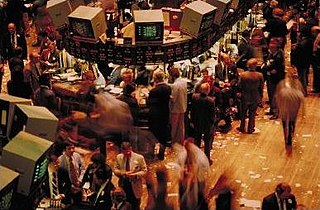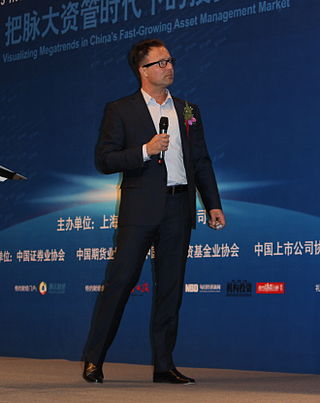Related Research Articles

A capital market is a financial market in which long-term debt or equity-backed securities are bought and sold, in contrast to a money market where short-term debt is bought and sold. Capital markets channel the wealth of savers to those who can put it to long-term productive use, such as companies or governments making long-term investments. Financial regulators like Securities and Exchange Board of India (SEBI), Bank of England (BoE) and the U.S. Securities and Exchange Commission (SEC) oversee capital markets to protect investors against fraud, among other duties.
Investment is traditionally defined as the "commitment of resources to achieve later benefits". If an investment involves money, then it can be defined as a "commitment of money to receive more money later". From a broader viewpoint, an investment can be defined as "to tailor the pattern of expenditure and receipt of resources to optimise the desirable patterns of these flows". When expenditures and receipts are defined in terms of money, then the net monetary receipt in a time period is termed cash flow, while money received in a series of several time periods is termed cash flow stream.
An index fund is a mutual fund or exchange-traded fund (ETF) designed to follow certain preset rules so that it can replicate the performance ("track") of a specified basket of underlying investments. While index providers often emphasize that they are for-profit organizations, index providers have the ability to act as "reluctant regulators" when determining which companies are suitable for an index. Those rules may include tracking prominent indices like the S&P 500 or the Dow Jones Industrial Average or implementation rules, such as tax-management, tracking error minimization, large block trading or patient/flexible trading strategies that allow for greater tracking error but lower market impact costs. Index funds may also have rules that screen for social and sustainable criteria.

Day trading is a form of speculation in securities in which a trader buys and sells a financial instrument within the same trading day, so that all positions are closed before the market closes for the trading day to avoid unmanageable risks and negative price gaps between one day's close and the next day's price at the open. Traders who trade in this capacity are generally classified as speculators. Day trading contrasts with the long-term trades underlying buy-and-hold and value investing strategies. Day trading may require fast trade execution, sometimes as fast as milli-seconds in scalping, therefore direct-access day trading software is often needed.
Market timing is the strategy of making buying or selling decisions of financial assets by attempting to predict future market price movements. The prediction may be based on an outlook of market or economic conditions resulting from technical or fundamental analysis. This is an investment strategy based on the outlook for an aggregate market rather than for a particular financial asset.
Investment management is the professional asset management of various securities, including shareholdings, bonds, and other assets, such as real estate, to meet specified investment goals for the benefit of investors. Investors may be institutions, such as insurance companies, pension funds, corporations, charities, educational establishments, or private investors, either directly via investment contracts/mandates or via collective investment schemes like mutual funds, exchange-traded funds, or Real estate investment trusts.
Buy and hold, also called position trading, is an investment strategy whereby an investor buys financial assets or non-financial assets such as real estate, to hold them long term, with the goal of realizing price appreciation, despite volatility.
In finance, an investment strategy is a set of rules, behaviors or procedures, designed to guide an investor's selection of an investment portfolio. Individuals have different profit objectives, and their individual skills make different tactics and strategies appropriate. Some choices involve a tradeoff between risk and return. Most investors fall somewhere in between, accepting some risk for the expectation of higher returns.
Edward Arthur Seykota is a commodities trader, who earned B.S. degrees in Electrical Engineering from MIT and Management from the MIT Sloan School of Management, both in 1969. In 1970, Seykota pioneered systems trading by using early punched card computers to test market trading ideas. Seykota resided in Incline Village, Nevada, on the north shore of Lake Tahoe, but moved to Texas.

A stock trader or equity trader or share trader, also called a stock investor, is a person or company involved in trading equity securities and attempting to profit from the purchase and sale of those securities. Stock traders may be an investor, agent, hedger, arbitrageur, speculator, or stockbroker. Such equity trading in large publicly traded companies may be through a stock exchange. Stock shares in smaller public companies may be bought and sold in over-the-counter (OTC) markets or in some instances in equity crowdfunding platforms.
Jack Schwager is a trader and author. His books include Market Wizards (1989), The New Market Wizards (1992), Stock Market Wizards (2001) and Unknown Market Wizards: The best traders you've never heard of (2020). He is a well-known author, fund manager and an industry expert in futures and hedge funds. He's published a number of books, such as Market Wizards.

Commodities Corporation was a financial services company, based in Princeton, New Jersey, that traded actively across various commodities. The firm was noted as one of the leading commodity and futures trading firms. CC is credited for launching the careers of many notable hedge fund investors and for its influence on global macro investing.
Lawrence D. Hite is a hedge fund manager who, along with Ed Seykota, is one of the forefathers of system trading. He is the author of the book, The Rule: How I Beat the Odds in the Markets and in Life—and How You Can Too, which was named a Wall Street Journal, LA Times, and Porchlight Books bestseller.
Linda Bradford Raschke (/'ræʃki/) is an American financier, operating mostly as a commodities and futures trader.
Thomas F. Basso is an American hedge fund manager. He was president and founder of Trendstat Capital Management. He is the author of two books, Panic-Proof Investing and the self-published The Frustrated Investor. In 1998, he was elected to the board of the National Futures Association.
Trend following or trend trading is a trading strategy according to which one should buy an asset when its price trend goes up, and sell when its trend goes down, expecting price movements to continue.
Lucian Thomas Baldwin III is a bond trader investor and founder of the Baldwin Group of companies. He was described by the Wall Street Journal as a trader who can singlehandedly move the Treasury bond market. He often trades the 30-year bond in the pits of the Chicago Board of Trade.

Reminiscences of a Stock Operator is a 1923 roman à clef by American author Edwin Lefèvre. It is told in the first person by a character inspired by the life of stock trader Jesse Livermore up to that point.
CAN SLIM is an acronym developed by the American stock research and education company Investor's Business Daily, intended to represents the seven characteristics that top-performing stocks often share before making their biggest price gains.

Michael W. Covel is an American author, entrepreneur, and film director. In 1996, he co-founded TurtleTrader.com, later expanded into TrendFollowing.com, a popular online resource focused on investment style known as trend following, which allows investors to profit in both up and down markets.
References
- ↑ "Mutual Fund Timing Strategies: Application of Gil Blake's Strategy to Indian Markets". Sri Sathya Sai Institute of Higher Learning.
- ↑ "Gil Blake Profiled in the Market Wizards".